Sunday Feb 15, 2026
Sunday Feb 15, 2026
Saturday, 6 February 2016 03:03 - - {{hitsCtrl.values.hits}}
In the kitchen Marco Pierre White’s stature as the colossus of his generation is unlikely ever to be dimmed, but it is his charm and approachability that won hearts during his Sri Lanka tour
By Uditha Jayasinghe
Marco Pierre White strides into the room in his chef whites, late from having breakfast with the Prime Minister at Temple Trees, shakes the hands of everyone around him and gestures for 40-odd chefs to cluster around him. The air is tense with expectation.
Hailed as the ‘Godfather of Modern Cooking,’ Marco was the first celebrity chef in the world. He had it all.The unforgettable talent, mercurial temper that famously made Gordon Ramsay cry, tousled hair, geometric cheekbones, and three Michelin stars.
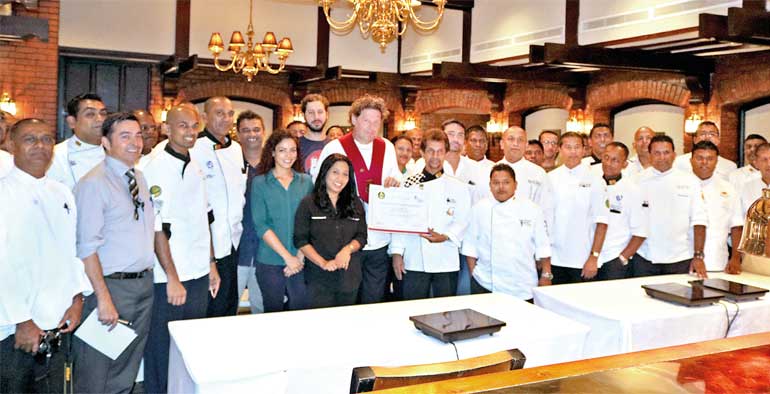 Marco with Master class participants
Marco with Master class participants
Having won his way to the top and stamped his name on a string of award-winning restaurants, Marco gave it all up in 1999, walking away from the stove because he was “judged by people who knew less about food than he did”.His sterling career is heavily sprinkled with barbed comments and barely-controlled aggression, aimed at making professional chefs tremble like dropped jellies.
Marco once threw 54 bankers out of his restaurant and slashed open the back of a chef’s shirt with a paring knife because he complained of heat in the kitchen (the chef had to continue working). He is quick to pick a fight but generous to his friends, a trait that makes him ideal to be cast in his favourite movie,‘The Godfather’. But Marco sheds all this as he talks. Gone is the loudmouthed swagger familiar in Hell’s Kitchen and in its place is the soft voice of a wise grandfather, barely reaching the back of the room.
"The more you do to food, the more you take away
I would say success is born out of good luck. It is awareness of mind that takes advantage of the opportunity… and the opportunity is the luck… Luck is the opportunity you get in life
Once your dream becomes a reality, you start feeling all this pressure to stay in that position. And that's not as much fun"
Unintended chef
“This is the truth. I never chose to be a chef. That wasn’t my want. I came from very humble beginnings, I finished school on the Friday, and I started work on the Monday, in the profession of my father, uncle, grandfather and brothers. That was what working-class boys did: they entered a trade,” he says, after insisting each participant of the Masterclass, chef or not, asks him one question.
It is clear Marco is proud of his working class roots in Leeds and deeply marked by the tragic death of his mother when he was six. Marco’s life in the kitchen started when he was 16, the rapid rise capped by becoming the youngest British chef ever to win all three Michelin stars at 33. He also collected three failed marriages and four children along the way.
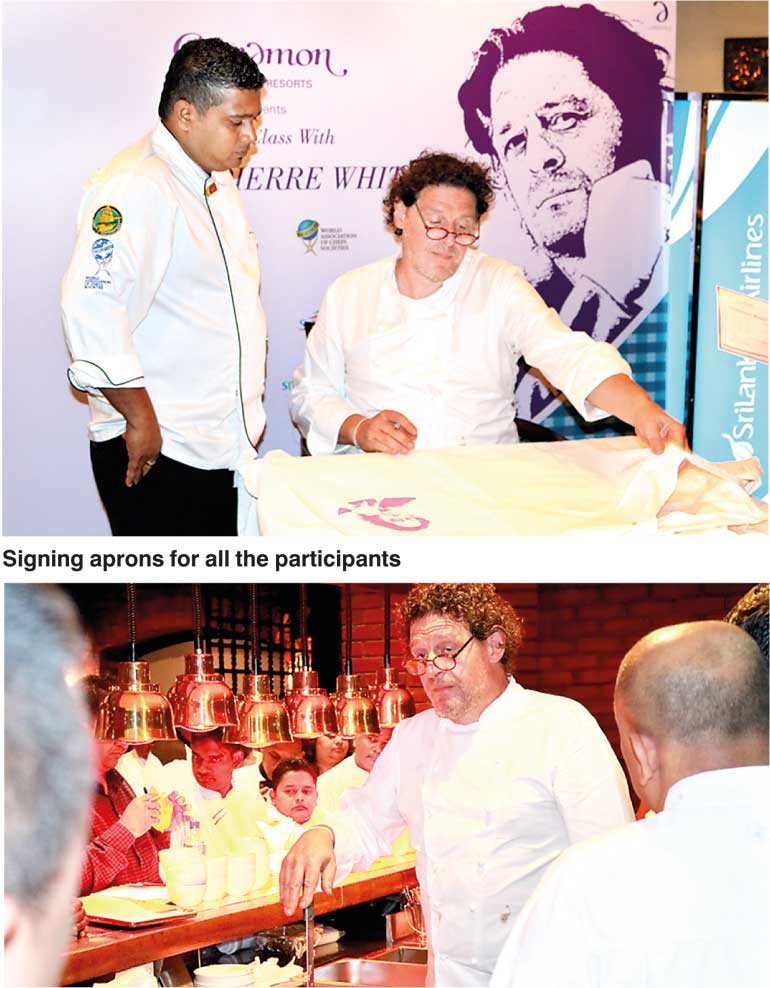
Marco’s fiend-like work ethic was born out of fear he would die before he reached his dream. The long hours were perfectly captured in photos for his first book ‘White Heat,’ where he is seen with a cigarette dangling from his lips, which whipped up a mountain of fans.
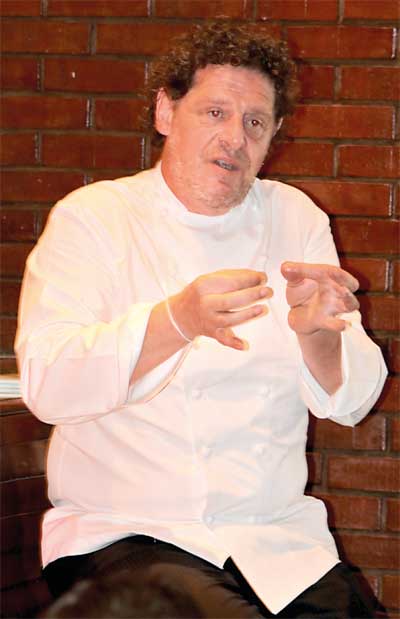 His rock star status attracted thousands of middle class kids into the kitchen, paving the way for an entire generation of celebrity chefs includingGordon Ramsay, Philip Howard, Stephen Terry, Eric Chavot, Bryn Williams, Matt Tebbutt and Philippe Messy who was the youngest sommelier to gain three Michelin stars, to name a few.
His rock star status attracted thousands of middle class kids into the kitchen, paving the way for an entire generation of celebrity chefs includingGordon Ramsay, Philip Howard, Stephen Terry, Eric Chavot, Bryn Williams, Matt Tebbutt and Philippe Messy who was the youngest sommelier to gain three Michelin stars, to name a few.
“I had achieved my dream, I was getting the top accolades in every guide for my restaurants and I suddenly realised there was only one way to go – down. Once your dream becomes a reality, you start feeling all this pressure to stay in that position. And that’s not as much fun.”
Hanging up the apron
Fun, he rediscovered, by entering the restaurant business, which after many twists and turns, resulted in dozens of Marco Pierre White branded restaurants rolled out around the world, TV roles and returning to good cooking the old fashioned way.
He “hides out” at an estate in the outskirts of London, hunting, fishing and planting, but also flits around the world managing his multi-million pound empire. Marco has also sold the rights to his biography ‘White Slave’ and Michael Fassbender has first refusal to play the lead role.
“I’m a classicist. I don’t like strange combinations. I like things to make sense. I don’t get peculiar combinations.I like salmon, and I like liquorice, but salmon and liquorice… I don’t get it …molecular gastronomy is just a label...” he notes while pithily slicing through lobster with a giant knife to create a dish for the participants, all the while wielding questions.
“When you walk into a three [Michelin] star restaurant, it should smell like a three-star. But one-stars are different. The problem with so many one-stars is you can’t smell the food: it’s all water baths and foams and gels. Where’s the 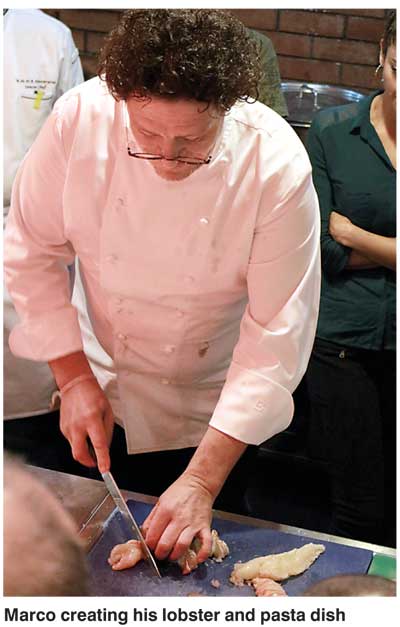 smell of good cooking?”
smell of good cooking?”
Michelin, the tyre company, began the ratings for their customers at the turn of the century but the guide’s gradual popularity as the measurement of excellence in the industry resulted in it expanding to new countries, which eventually says Marco, made it more commercial than distinct.
“The more you do to food, the more you take away,” Marco says, as he makes a simple pasta recipe with a roux-based béchamel sauce emulsified with dark brown lobster stock and dashed with tarragon. Everything is tossed together in a giant pot and he ladles out bowls to eager participants, the epitome of his preferred way of cooking.Nothing fancily plated but comfort food full of flavour.
In the midst of questions, Marco defends his role as a promoter of stock cube Knorr, which he has been part of for nine years. “Look, I am not saying you should make stock with Knorr. I don’t. I make my own stock. But I use Knorr to season, always have.”
On life and business, his answers are peppered with Marcoisms, each sentence crafted and slightly studied but delivered with biblical-sounding intensity.
“I am ruled by the ego, and I am a perfectionist. And perfectionism is lots of little things done well,” he tells chefs curious to know how he worked his way to the top. “Be patient. If you push things before their time in life, they break,” he cautions another chef who tells of his dream to open a restaurant. “I ended up owning a restaurant by accident; it became a success because of a review done in the Sunday Times, not because of my food.”
Passing on lessons
Marco enjoys talking to other chefs about his experiences in his early days, what he learned and things he feels obliged to pass on: “In my first job, I learned how to say ‘yes chef’, to run, to multitask… and those early lessons are 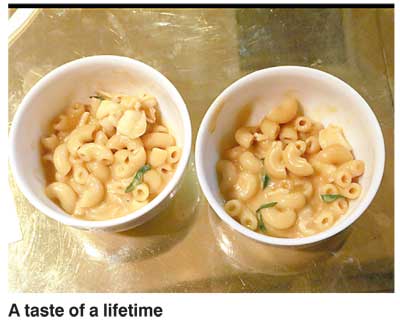 vital.I always tell young people: turn up on time; never call in sick; never, ever walk out, and always turn up in your best suit for an interview. It’s all about respect.”
vital.I always tell young people: turn up on time; never call in sick; never, ever walk out, and always turn up in your best suit for an interview. It’s all about respect.”
“Get your staff to believe in your dream,” he tells members of the Chefs’ Guild, “understand the strength of yourself and then your team. You may be a star but if your staff can’t execute your menu then you are in trouble.” After musing for a few seconds, “Service is the reason people return to a restaurant that is more important than the food.”
“I say to my daughter, Mirabelle (who is training to beaballerina), if you have a dream, you have a duty and responsibility to yourself to make it come true. Visualise your dream; if you can’t, then it will not come true.”
The questions, some technical, mostly personal, roll on and three solid hours after he starts the Masterclass Marco is ready for a break, nipping out for a smoke before returning to do a marathon autographing session of personalised aprons, photos and certificates for each participant.
In the kitchen Marco’s stature as the colossus of his generation is unlikely ever to be dimmed, but it is his charm and approachability that won hearts of local and foreign chefs at the Masterclass organised at Cinnamon Grand as part of his tour to Sri Lanka. His many compliments of Sri Lankan food (“I have never eaten so well in any other country I have ever visited”) certainly added to his affability.
“I would say success is born out of good luck. It is awareness of mind that takes advantage of the opportunity… and the opportunity is the luck… Luck is the opportunity you get in life.”